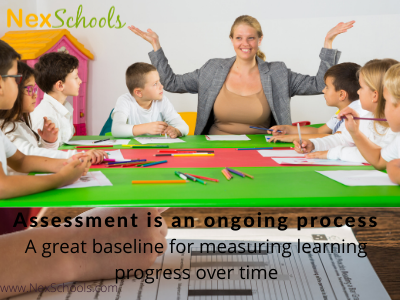By Maradula Singh

We all know the challenges of assessment in schools; online learning has added all together new problems. Face to face has been replaced by screens which have posed a new set of engagement and learning outcome issues in the classrooms. The fact is whether it is online classes or physical school, methods of assessment and its outcome have been debated by the education fraternity for a long time.
Hands up if you know the answer: What do you mean by ………?
Hand signals and ask students to summarize - are the most commonly used methods to check students' understanding. The problem is, we rely on these measures to test understanding and move on.
Secondly, teachers talk more than they teach, especially when they need to cover a lot of material in a short period of time and they all know. Teachers hope most of the time students will understand, if not now then before the test time, and we all keep our fingers crossed that their results will indicate we have done a good job. We all also include the parents and school leaders as factors.
So at the outcome is term end paper pen tests become the benchmark of success for students directly and indirectly all of us as factors that facilitate or help in this assessment process including school leaders, teachers and parents.
The aim of the assessments is misunderstood nowadays. The main objective of the assessment is to help students develop understanding and improve learning. Whereas all that we focus on is the memory test through one time test all skills through paper and pen.
Every child comes with own strengths, unique abilities and different types of learning.
Laura Greenstein, author of the book, What Teachers Really Need To Know About Formative Assessment explains in her blog , “assessment is more than a test, it is physical, social and emotional too.”
We see many children in the classroom who are introverts hiding their faces not because they don’t know the answer but because they are shy. Not many children can express themselves in the classroom despite knowing the concepts. This is because assessments are under increased scrutiny. Secondly, children keep it all in.
Assessments are not the end; it is a process from start to end.
Most assessments happen at the end and learning outcomes are measured at the end period. There is no mechanism to gauge understanding of small nuggets, concepts and lessons. The focus on the personal quotient of each student seems far from reality. The assessments ideally should provide the strengths and weaknesses of each student so teachers can adjust and guide student learning accordingly.
Cycle of Assessment
Pre-Assessment Is Important
The cycle of assessment should take into consideration pre-assessment. Pre-assessment allows teachers to evaluate the students' understanding before beginning to teach. It can occur at the start of a lesson, the beginning of a unit or the introduction of a new idea, concept or skill.
Assessment helps the teacher determine what to teach, how to teach and in the end, how effectively they taught it.
 Assessment As An Ongoing Process
Assessment As An Ongoing Process
Using assessments as an ongoing process after the chapter is completed gives the teacher a window into students’ knowledge, skills, and misconceptions – but also provides a great baseline for measuring learning progress over time.
Application-based assessment as an ongoing process can be used to rouse students’ curiosity for everyday uses, inspire critical thinking and the spotlight should be on how it solve problems in real life. The advantage of the ongoing process is engaging and instills new ways of understanding the concept.
Assessments are stressful for both students and teachers. Finger tapping on the table or shortened temper are some signs of stress which can be seen among students.
How can we take away fear, stress, daunting and overwhelming feelings for both the teachers and students related to assessments? How can schools worry less about performance in letter grades of students and numerical percentages and focus on an ongoing process of assessment?
Is Online Asessment An Answer?
Does the new technology have the answer for all these? We tried to find out from the people who are providing solutions through the edtech assessment platforms for K12 and they vouch for not just providing solutions but also some good problem-solving ideas.
“Artificial Intelligence is working to fill the gaps in assessments and in particular in an ongoing process of assessments by taking the extra load of teachers. It is helping in pinpointing exact gaps in academics for students, teachers and the principals of the schools are leveraging from data-oriented decisions to improve whole school learning outcomes", said Indeevar Varma, Co-Founder, PepStudy & Core Committee Member Edtech at Federation of Indian Chambers of Commerce & Industry. The positive aspects of technology have been experienced by schools during this pandemic crisis, if online assessments and teachers’ touch can work together; we are sure to see the ray of hope for better.
Some Key Challenges of Assessments
The proliferation of multiple assessment organizations and tools are commendable. In the study conducted by Lydia M. Conca, Carlota P. Schecter, and Sharon Castle about the conversations for what teachers talked of assessment driven instruction-assessment it was found – that 46% of their time is spent on assessments and assessment-driven instruction. Other evidence suggests that the classroom was engaged based on the topics that comprise assessment over individual students' needs.
We surveyed 50 teachers to find out the top 5 assessment challenges in the online and offline way of teaching.

The teachers were asked what are the top 5 challenges of assessments both online and offline, and here is what they listed:
Online Assessment
1. Encounter technical difficulties
2. Time to upload the questions and time to upload the images
3. Framing papers is difficult for teachers
4. Unfamiliarity in how to complete the assessment
5. Answering subjective type questions posed problems to middle and high school
Offline Assessment
1. Time Management
2. Planning ahead/study skills
3. Paucity of time to practice in class
4. Ongoing assessment is time-consuming
5. Personalized attention and picking the learning gap tedious
Noor Hossain, a teacher in Wisdom High International School, Nashik, pointed out that during online classes more problems are based on assessments. They include framing question papers for assessments, correction of the assessments, technical hitches in internet connection, and honesty of the students while answering.
Many other teachers are facing problems for assessing subjective answers which are uploaded for the assessments - answers uploaded are blurred and hazy which is affecting the health and eyes of the teachers added Serena Gay from the USA.

Shreeya Bhasin, a teacher from High School shared her concerns for the board classes in particular. She said, “Teachers do not want to focus only on the test papers based approach towards teaching yet they do it due to the system. We are worried about the students who really need hand holding but unfortunately the fast paced learning doesn’t give us enough time to spare for each student. While highlighting some key challenges, it is also observed that there is more emphasis on the one-time assessment and somewhere the key to identifying the correct level of each student is missing or sidelined in the process of assessment.
To some extent, tech-driven assessments are solving some of the challenges listed here by teachers. The online assessment platforms can speed up the process of assessment taking away the unvarying load of filling out multiple sheets, framing the question papers and so much more.
When asked to teachers what can be the biggest takeaway in opting for online assessment? There was a unanimous answer for the online assessment platform - curriculum aligned assessments and activities based on each student’s need. Nailing the student’s learning journey, pointing to the exact learning gap and working on the weaknesses of each child in the classroom would be the way forward for making the learning path smooth, so will our assessments be near correct.
Do you think whether it is a COVID-19 pandemic crisis which forced us all to take online learning mode or the normal times where children are in the schools- blended learning by integrating online tools would make the teachers and students stronger along with our schools?
NexSchools Conducted Teachers Survey – Our special thanks to the community of NexSchools and special thanks to Global Educators Collectors for the responses
Refs: Challenges teachers face as they work to connect assessment and instruction - Lydia M. Conca * ,Carlota P. Schechter &Sharon Castle Pages 59-75 | Published online: 24 Jan 2007 - https://doi.org/10.1080/13540600320000170927
Certificate Courses

For Children - Cyber Warrior Student Ambassador - Be A Cyber Leader- Primary & Middle Schools Click here to register
For Teachers - Edu bloggers Certificate Course | Cyber Warrior Teacher Ambassador -
Be an Internet Legend | Edtech Teaching Tools |

Cyber Safety Initiatives by NexSchools
Wall Of I Support For Cyber Safety Awareness Campaign
NexSchools Announces Successful Completion of Cyber Warrior Ambassador Certificate Course
Enter in Sweepstakes and Avail Discount in our various courses
NexSchools Runs The Largest School Cyber Safety Awareness Campaign
NexSchools Becomes STOP. THINK. CONNECT. Partner
School Children Making A Difference With Blogs
Celebrating Success Stories Of Lil Bloggers
NexSchools Announces Successful Completion of Cyber Warrior Ambassador Certificate Course
